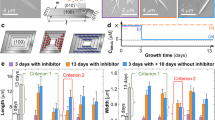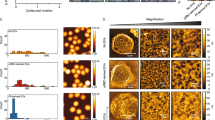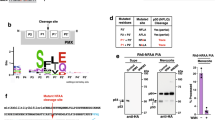Abstract
MALARIAL parasites growing inside erythrocytes digest up to 80% of the host cell's haemoglobin within a lysosomal organelle, the digestive vacuole1,2. They sequester the potentially toxic haem (Fe (II) protohaematoporphyrin) that is released during this process into an insoluble pigment called haemozoin, which consists of polymerized Fe (III) protohaematoporphyrin subunits3. We have studied this process of haem polymerization, which was previously reported to be enzyme-mediated and the target of the quinoline antimalarial drugs chloroquine and quinine4. Here we show that, rather than being enzyme-mediated, haem polymerization is actually a chemical process, dependent only on the presence of haem-derived material associated with haemozoin and not on protein. This discovery does not invalidate haem polymerization as a target for drug intervention and the mechanism by which haemozoin formation is initiated is still not understood, but our view of this process and of the action of chloroquine must be reconsidered.
This is a preview of subscription content, access via your institution
Access options
Subscribe to this journal
Receive 51 print issues and online access
$199.00 per year
only $3.90 per issue
Buy this article
- Purchase on Springer Link
- Instant access to full article PDF
Prices may be subject to local taxes which are calculated during checkout
Similar content being viewed by others
References
Goldberg, D. E. & Slater, A. F. G. Parasit. Today 8, 280–283 (1992).
Slater, A. F. G. Pharmac. Ther. 57, 203–235 (1993).
Slater, A. F. G. et al. Proc. natn. Acad. Sci. U.S.A. 88, 325–329 (1991).
Slater, A. F. G. & Cerami, A. Nature 355, 167–169 (1992).
Slater, A. F. G. & Cerami, A. Int. Patent Appl. PCT/US92/11279 (1993).
Ashong, J. O., Blench, I. P. & Warhurst, D. C. Trans. R. Soc. trop. Med. Hyg. 83, 167–172 (1989).
Goldberg, D. E., Slater, A. F. G., Cerami, A. & Henderson, G. B. Proc. natn. Acad. Sci. U.S.A. 87, 2931–2935 (1990).
Fitch, C. D. & Kanjananggulan, P. J. biol. Chem. 262, 15552–15555 (1987).
Cohen, P., Broekman, M. J., Verkley, A., Lisman, J. W. W. & Derksen, A. J. clin. Invest. 50, 762–772 (1971).
Gushimana, Y., Doepner, B., Martinez-Hackert, E. & Ilgenfritz, G. Biophys. Chem. 47, 153–162 (1993).
Egan, T. J., Ross, D. C. & Adams, P. A. FEBS Lett. 352, 54–57 (1994).
Fitch, C. D. et al. Antimicrob. Agents Chemother. 21, 819–822 (1982).
Trager, W. & Jensen, J. B. Science 193, 673–675 (1976).
Lambros, C. & Vanderberg, J. P. J. Parasit. 65, 418–420 (1979).
Goman, M. et al. Molec. Biochem. Parasit. 5, 391–400 (1982).
Author information
Authors and Affiliations
Rights and permissions
About this article
Cite this article
Dorn, A., Stoffel, R., Matile, H. et al. Malarial haemozoin/β-haematin supports haem polymerization in the absence of protein. Nature 374, 269–271 (1995). https://doi.org/10.1038/374269a0
Received:
Accepted:
Issue Date:
DOI: https://doi.org/10.1038/374269a0
This article is cited by
-
Hemozoin in malaria eradication—from material science, technology to field test
NPG Asia Materials (2023)
-
Development of a human malaria-on-a-chip disease model for drug efficacy and off-target toxicity evaluation
Scientific Reports (2023)
-
Malaria parasite heme biosynthesis promotes and griseofulvin protects against cerebral malaria in mice
Nature Communications (2022)
-
Synthesis and in silico ADME/Tox profiling studies of heterocyclic hybrids based on chloroquine scaffolds with potential antimalarial activity
Parasitology Research (2022)
-
Synthesis and In Vitro Antimalarial Activity Evaluation of Some New 1,2-Diaminopropane Side-Chain-Modified 4-Aminoquinoline Mannich Bases
Pharmaceutical Chemistry Journal (2021)
Comments
By submitting a comment you agree to abide by our Terms and Community Guidelines. If you find something abusive or that does not comply with our terms or guidelines please flag it as inappropriate.



